'Clock is running out': As COVID-19 cases climb, Biden faces rising pressure to fill top FDA job
WASHINGTON – In early March, as President Joe Biden assembled his administration while trying to take control of the coronavirus pandemic, six former leaders of the Food and Drug Administration urged him to prioritize picking an FDA commissioner.
Five months later, Biden still hasn’t nominated anyone.
“My concern is that the clock is running out,” said Andrew von Eschenbach, who ran the FDA during part of the George W. Bush administration.
The agency has not given full approval to the COVID-19 vaccines – just one of the pandemic challenges it faces – although von Eschenbach and two other former commissioners told USA TODAY they don’t think the lack of a permanent commissioner is a factor.
They, and other experts, cite a list of issues on the FDA’s plate, including keeping up with the dangerous coronavirus variants, supporting the development of antiviral treatments, advancing the availability of reliable, easy-to-use tests, implementing regulations for tobacco products and food safety provisions and addressing a backlog of facility inspections.
“It is taking a long time,” former commissioner Mark McClellan said of the nomination. “I think that does make a difference for an agency that’s so central to not only so much of everyday life for Americans but especially in the midst of the pandemic.”
Even in normal times, the FDA has a huge portfolio. It regulates about 20% of U.S. consumer purchases and 78% of the nation’s food supply.
“It’s a massive agency,” said Gillian Woollett, principal research scientist who leads the FDA practice at Avalere, a health care business consulting firm. “There’s a whole sector of the economy that’s critically dependent on those FDA approvals."
Democrats, not Republicans, oppose Biden's acting FDA chief
Dr. Janet Woodcock, the longtime FDA administrator whom Biden made the acting commissioner, has the support of the top Republican on the Senate committee that will vet the eventual nominee.
Some Democrats oppose giving Woodcock the permanent position. They accuse her of being too cozy with the drug industry in the regulation of opioid-based painkillers.
“We cannot have an FDA administrator who oversaw the approval of dangerous drugs without sufficient consideration of the role they play in the ongoing addiction crisis in Nevada and across the country,” Sen. Catherine Cortez Masto, D-Nev., said in a statement.
The criticism that rained down on the FDA after its approval of a controversial Alzheimer’s drug didn’t help Woodcock.
Both her supporters and detractors say the president needs to make a decision, one way or the other.
Though the White House insists Biden is “eager to nominate someone,” the administration is not signaling it's in a rush.
“He wants to make sure we have the right person to nominate, and he’s not going to do it at a pace faster than having the right person to put forward,” White House press secretary Jen Psaki said last week.
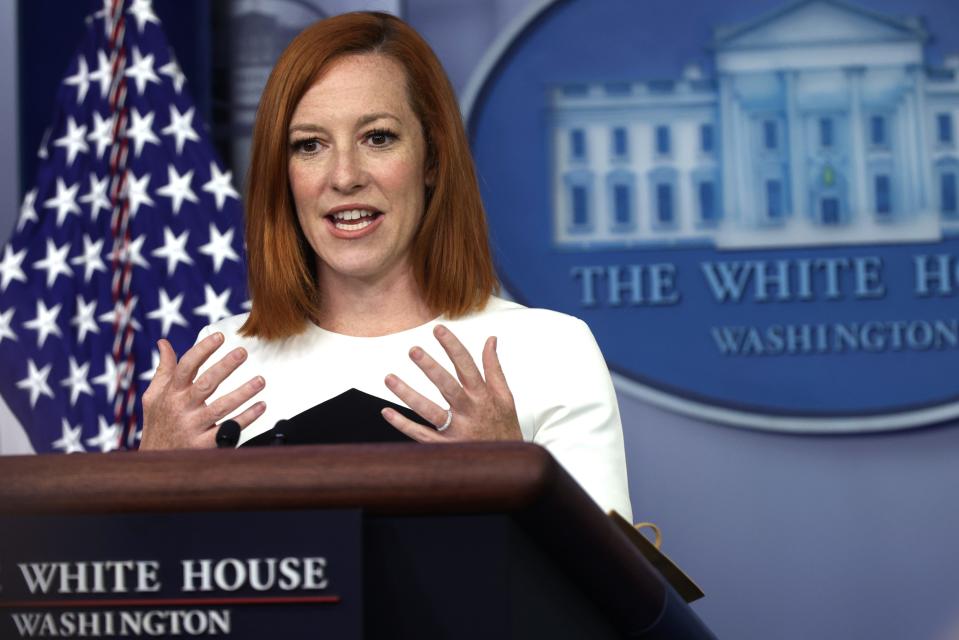
Gaps in commissioners before
This is not the first time the FDA has been without a permanent commissioner for an extended period.
McClellan, Bush’s first commissioner, wasn’t sworn in until two years after Bush’s 2000 victory.
McClellan said the Bush administration wanted to fill the post, but “9/11 happened.”
“I understand that there are lots of things that can complicate getting such an important nomination done,” he said.” But hopefully, they'll be able to move something forward soon.”
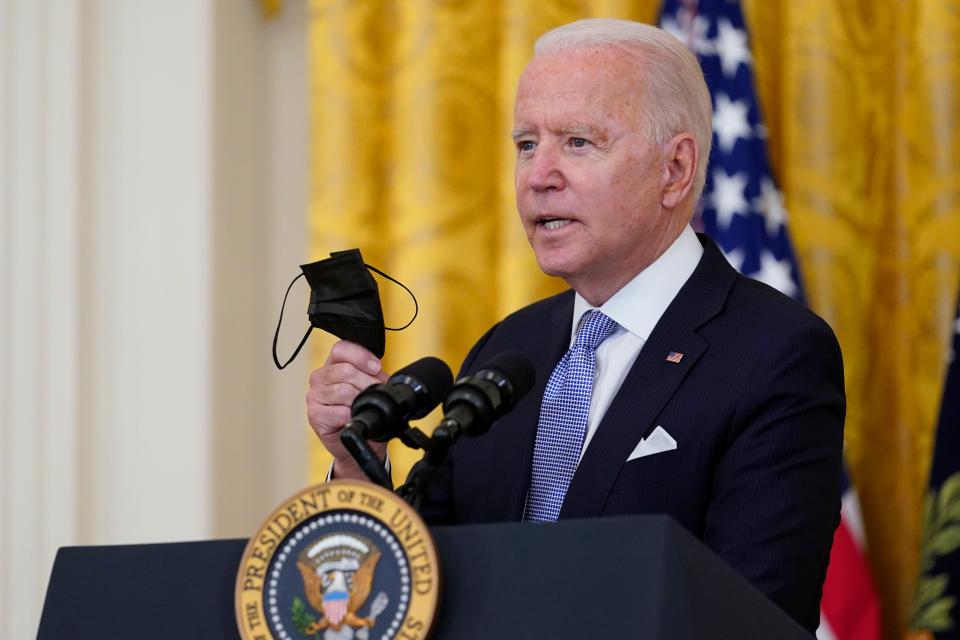
Dr. Jane Henney, who was FDA commissioner at the end of the Clinton administration, said she’s not surprised by the delay, given how long the process can take. Nominated in June 1998, Henney wasn’t confirmed until November. After senators had their initial run at Henney during her six-hour confirmation hearing, they sent her an additional 600 questions to answers.
“I mean, come on!” Henney said. “You think, ‘And I want to do this job?’”
'Painfully slow'
Max Stier, president of the Partnership for Public Service, a nonprofit, nonpartisan good-governance organization, called getting the approximately 1,200 Senate-confirmed positions through the process “painfully slow.”
“It’s always been bad, and it’s getting worse,” Stier said.
The Biden administration is waiting for the Senate to act on about 200 nominees.
“All that said,” Stier added, “what the administration has control over is who they nominate. And, obviously, the FDA commissioner is a very important position.”
On that point, the White House agrees.
“The role of FDA commissioner is critically important, especially during the COVID-19 pandemic,” deputy press secretary Chris Meagher said in a statement. But he pointed to the “strong acting leadership in place” as he said the White House looks “forward to sharing a nominee with the requisite expertise and leadership for this job.”
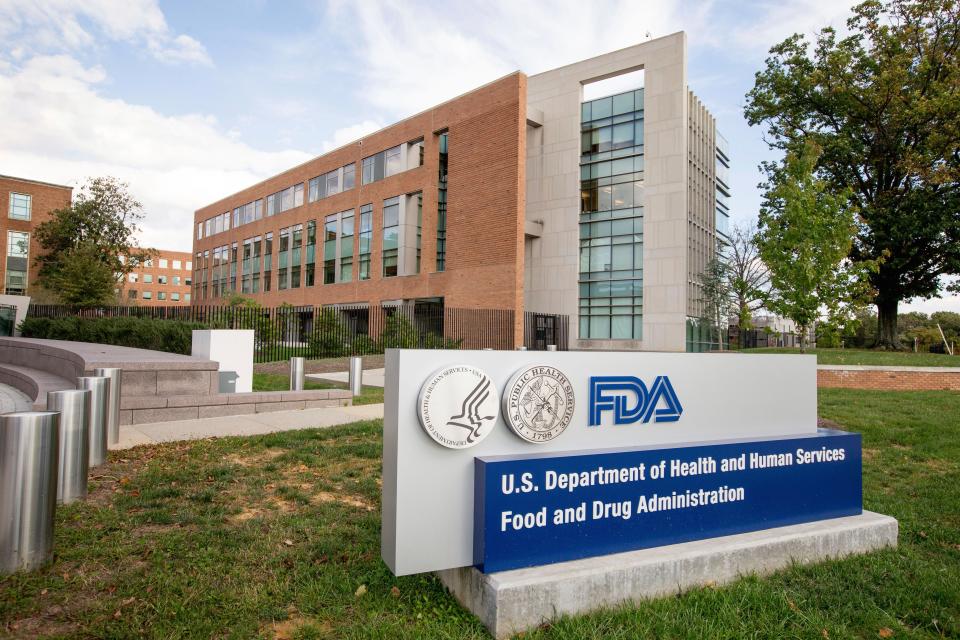
Limits on acting commissioners
Woodcock, a 35-year veteran of the agency, previously ran the Center for Drug Evaluation and Research, the largest of the FDA’s six centers.
Diana Zuckerman, president of the National Center for Health Research, said she suspects one reason the administration hasn’t moved faster is Woodcock is such a strong acting commissioner.
“A lot of people said she was basically running FDA for years when she wasn't commissioner,” Zuckerman said. “I can't tell you how many meetings I've been to where that has been said publicly, either by people who love her or people who don't love her.”
There are statutory limits to how long an acting commissioner can stay in the role.
Even someone with as much agency experience as Woodcock has is in a weakened position without the full authority of the administration and Senate behind her.
“Anybody in that acting role is always limited if they want to make major strategic changes, major organizational changes, really start moving policies in a different direction,” Henney said. “It doesn’t mean that you can’t keep functioning as an organization and making the critical decisions that the agency needs to do. But making bigger, bolder moves is probably not wise or not practical for somebody in an acting position.”
Having someone able to make major decisions is extra important, said Jon Bigelow, executive director of the Coalition for Healthcare Communication, because the FDA is coming off an “extraordinarily difficult period.”
After the effective leadership of Scott Gottlieb, the first commissioner in the Trump administration, the agency lost influence within the government and credibility with the public and morale dropped amid the pandemic soon after Stephen Hahn took over, Bigelow said.
The FDA faces challenges including approval of coronavirus vaccines and therapies, a decision on whether and when to require booster shots and a serious backlog in inspections of manufacturing facilities that is delaying drug approvals.
“In the context of a pandemic, virtually everyone would have expected that this would have been one of the early appointments,” Bigelow said.
John “Jack” Kalavritinos, who was part of the FDA transition team at the start of the Trump administration, said acting administrators keep the trains running but a confirmed nominee with an agenda behind him or her has a much better ability to drive change in agencies that are often change-resistant.
“I’ve really seen it firsthand,” Kalavritinos said. “You just are limited by what you can do.”
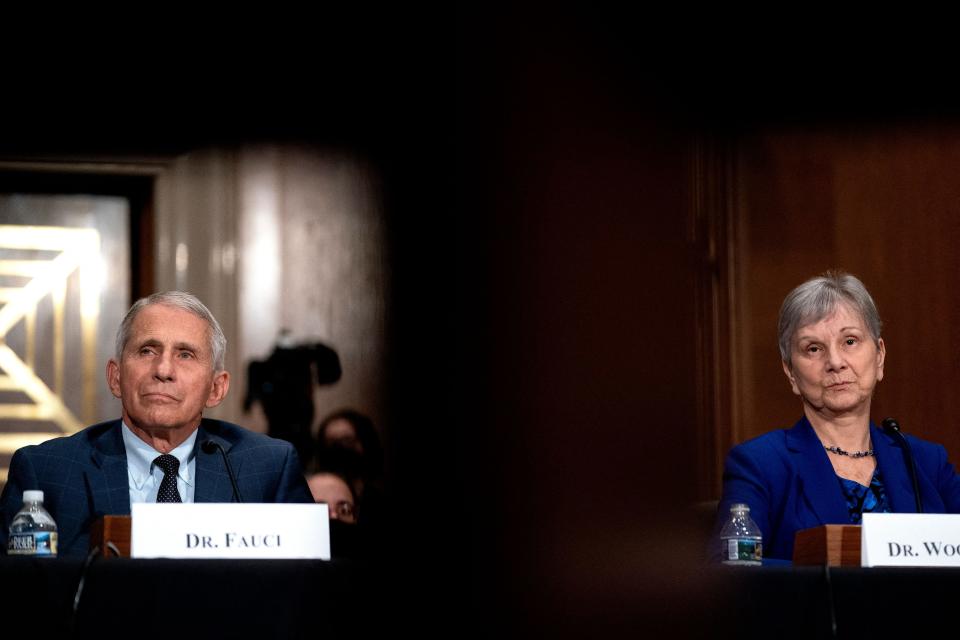
Waiting for vaccine approval
The FDA has come under criticism for not completing the approval process for the coronavirus vaccines, which are administered under an emergency use authorization. Full approval could reassure some Americans who have been hesitant to get a shot. It would also make it easier for employers, schools and others to mandate vaccines.
“In a world in which we need as many people vaccinated as soon as possible, the FDA's refusal to grant full approval to the COVID vaccines is mystifying,” tweeted Dan Pfeiffer, who was a senior adviser to President Barack Obama. “I get the need to follow a process, but 160 million or people have been vaccinated. This is bureaucracy over commonsense.”
William Schultz, who was a deputy FDA commissioner during the Clinton administration and general counsel at the Department of Health and Human Services during the Obama administration, said it is probably tough for Woodcock to try to expedite the decision.
“Because of interim status, it is difficult for an acting commissioner to weigh in on important decisions or to push FDA center directors to make decisions when there is a delay,” he said.
An FDA official explains: COVID-19 vaccines still don’t have full authorization. Why?
McClellan, Henney and von Eschenbach – three of six former commissioners who sent a letter to Biden in March praising Woodcock as “a highly effective advocate for advancing the FDA’s mission” – said they don’t think the lack of a confirmed commissioner is a reason the vaccines haven’t been given full approval.
“I've been close enough to these processes to know that they're working as fast as they can,” McClellan said.
When will everyone be vaccinated? Here's how the vaccine rollout is going
More: Comparing the COVID-19 vaccines
Alzheimer's drug controversy
In contrast, the FDA’s decision to greenlight the Alzheimer's drug Aduhelm, despite questions about its effectiveness was criticized as too speedy.
Woodcock defended the decision by the center responsible for drug applications but called for the agency’s inspector general to investigate whether the FDA’s interactions with drugmaker Biogen “were inconsistent with FDA policies and procedures.”
Woodcock faced a split between advocates for patients fighting cancer and rare diseases who like her support for innovative therapies and consumer advocates who say she’s too industry-friendly.
The cancer experts who support Woodcock include a doctor who treated Biden’s son Beau, who died in 2015 of brain cancer.
“She really likes to get products on the market quickly,” said Zuckerman, who falls on the opposite side from Woodcock on what she calls a philosophical divide over how fast drugs should be approved.
Interest groups who fault the center Woodcock headed for ignoring early warning signs on opioids lobby and advertise in the states of senators who would vote on confirming a commissioner.
“I am not aware that there has been lobbying for or against an FDA commissioner nominee for a long time,” Bigelow said.
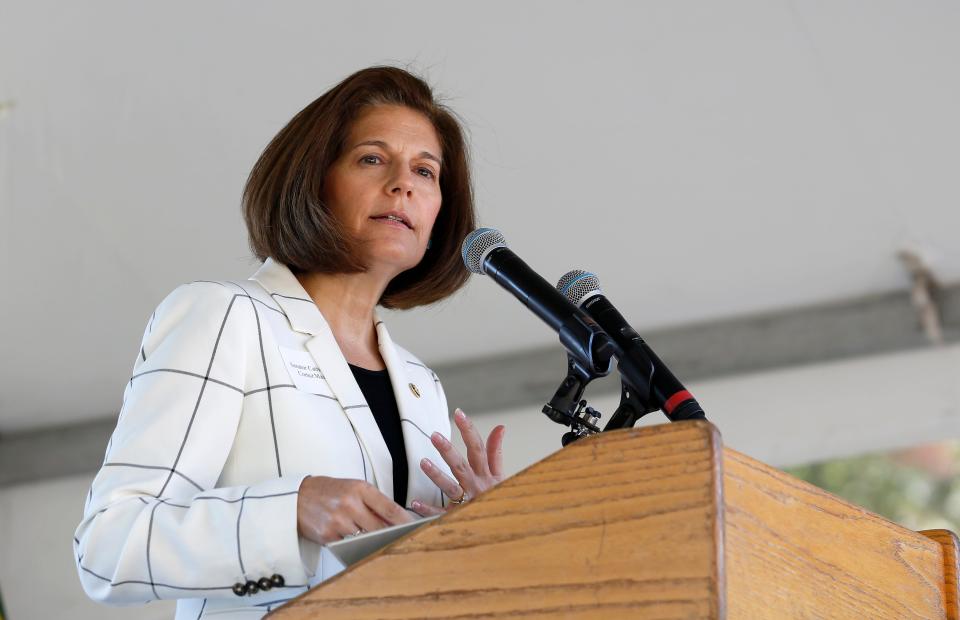
Opposition from fellow Democrats
The senators targeted include Joe Manchin, D-W.Va., whose state has been ravaged by the opioid epidemic and who, as a centrist, is a key vote in the closely divided Senate where Democrats have no room for error. Besides Manchin and Cortez Masto, other senators who have raised concerns about Woodcock include New Hampshire’s Maggie Hassan and Massachusetts’ Ed Markey, both Democrats.
“President Biden doesn't want to antagonize those four Democrats, especially Sen. Manchin, at a time when he needs their votes on other priorities,” Bigelow said.
In a letter Manchin sent Biden in June, he said installing a permanent agency head "is imperative, and Dr. Woodcock is not the right person to lead the FDA.”
“The FDA has played a critical role in this overdose epidemic by overseeing continuous approvals of stronger and more addictive opioids since the initial approval of OxyContin in 1995 – and Dr. Woodcock has been there for all of it,” Manchin wrote.

Need for a decision
Sen. Patty Murray, D-Wash., who heads the committee that will consider Biden’s nominee, declined an interview request. An aide said in a statement that Murray believes the FDA needs an experienced leader – “whoever that is” – as soon as possible. That person should protect the agency from political interference and uphold its gold standard of safety and effectiveness, the aide said.
North Carolina Sen. Richard Burr, the Senate health committee’s top Republican, praised Woodcock at a hearing, saying he hoped she would soon appear again as the nominee.
“You are the right person at the helm as we continue to grapple with the pandemic,” Burr said.
Anyone who has enough experience to do the job and is strong enough to make the required tough decisions will be seen as a hero to some people and a devil to others, Henney said.
“The challenge for Janet Woodcock is she's got powerful proponents and powerful opponents,” said Woollett, who leads the FDA practice at Avalere. “And we're necessarily at something of an impasse.”
That’s a situation the administration needs to end, either by nominating Woodcock or someone else, von Eschenbach said.
“The process has gone on for a long period of time,” he said, “and I hope it will come to closure.”
More: White House offers states COVID-19 'surge teams' as delta variant cases climb
More: CDC extends policy that allows migrants to be expelled over COVID-19 concerns
More: Biden urges landlords to pause evictions as White House scrambles for solutions
This article originally appeared on USA TODAY: As COVID-19 cases rise, Biden faces pressure to fill vacant FDA job

 Yahoo Movies
Yahoo Movies 